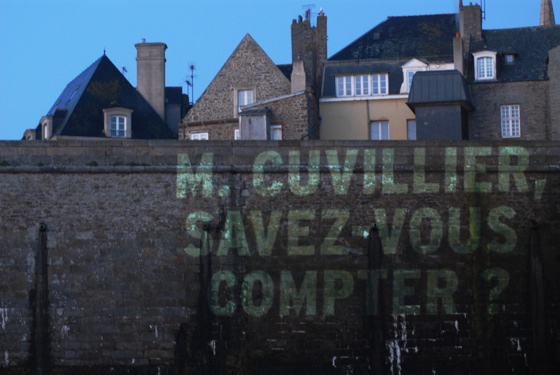What’s wrong with the French Parti Socialiste when it comes to fishing?

 Spending time on Arctic Sunrise in Saint-Malo, you gain the impression very quickly than some powers in the town are not at all content that Greenpeace is here. But of course that is precisely the reason why Greenpeace came here in the first place.
Spending time on Arctic Sunrise in Saint-Malo, you gain the impression very quickly than some powers in the town are not at all content that Greenpeace is here. But of course that is precisely the reason why Greenpeace came here in the first place.
Arctic Sunrise was supposed to be moored at Quai Saint-Louis, right next to the old town. Then upon arrival the ship was mysteriously shifted to a hidden spot behind an old salt depot on Chaussée des Corsaires, well away from any passing pedestrians and tourists. One of the locals even told me he thought they had moved a rusting old tug out of the way especially to put the Greenpeace ship in the most hidden spot possible.
Two socialist politicians are very much in Greenpeace’s sights: local Member of the European Parliament Isabelle Thomas (from Saint-Malo), and Fisheries Minister Frédéric Cuvillier (from Boulogne sur Mer, a future destination of Arctic Sunrise). What do both of these politicians have in common? They are both from the Parti Socialiste, and they are both resolutely opposed to proper reform of the Common Fisheries Policy. Put it another way: they are both in the pocket of the big fishing industry.
Thomas refuses to meet Greenpeace in Saint-Malo (and Cuvillier has so far declined invitations to meet them in Boulogne too), but of course that does not stop Thomas from sounding off about what Greenpeace is doing. A translation of the quote she gave to Ouest-France:
[Greenpeace] make a political and media coup. The policy must strike a balance between preserving resources, the seabed and jobs. It’s complicated. They have a catastrophic discourse that does not match reality. For ten years, the situation has improved. Stocks are not yet as good as they could be, but they are considered 50% well exploited. Fishing deserves more information, education about the marine world … not polemics.
Thomas’s basic argument is that Greenpeace is too radical, but if she were to actually have the guts to meet them she might actually find that – in rhetoric at least – she was not too far from the Greenpeace position. Whether she means what she says is of course another question.
Greenpeace’s line for French fisheries is a simple one. 80% of French fishing boats are what they call ‘pêche artisanale’ (more about it in French here) – small boats, less than 12m in length, and usually fishing within 12 nautical miles of the coast. 50% of French fishermen work on such boats, and the other 50% on larger vessels going outside the coastal zone. Greenpeace is hence trying to use the ‘pêche artisanale’ argument to square the circle of jobs and fish – low scale, small boat fishing is more labour intensive (and it preserves local jobs) but can help prevent over-fishing, which remains a problem – as even Thomas’s quote confirms. Yet the local bigger boats industry is trying to play the jobs argument right back at Greenpeace (see pic here).
Keep the jobs in the industry, and make European fisheries more environmentally sustainable: what’s wrong with that? And why will Thomas and Cuvillier refuse to engage with this argument? One can only conclude that the large fishing industries have their ear so firmly that both are unwilling to listen to reason. It’s big business capture more efficient even than their monster drag nets.
@Martin – while some comparisons with CAP are valid, this one doesn’t quite work. Firstly, in CAP it’s larger farmers that get most of the subsidy, and in CFP it’s larger boats that tend to get allocated most of the quota, and most of the cash for vessel subsidies. Also bear in mind that CAP is 40% of the EU budget, and CFP about 2%.
So – in short – we should not be subsidising any fishermen as far as I’m concerned, but if we do, better to subsidise small, environmentally more sustainable business than large scale industrial fishing.
Keep the jobs in the industry, and make European fisheries more environmentally sustainable: what’s wrong with that?
Admittedly without having done any reading beyond your blog post, I’m going to hazard a guess and say that it involves all of Europe paying French fishermen, like we pay French farmers, in order to allow them to keep pretending that it’s 1913 instead of 2013. At least (small) farmers can claim they are contributing to the landscape. Why should we be subsidising the fisheries industry again?